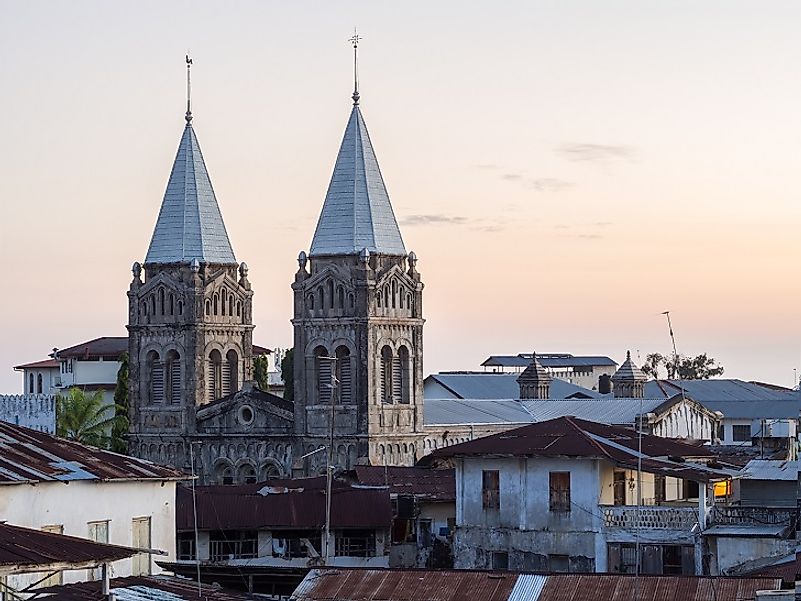Religious Beliefs In Tanzania

Tanzania is an East African nation with an estimated population of 51.8 million people. The country has two major religious groups, namely Christians and Muslims. Christianity is the predominant religion with more than half of the Tanzanian population identifying as Christians. Tanzanians generally identify as either Christian or Muslim, though many of these still practice folk beliefs as well. Minority groups such as Traditional Africanist, Buddhist, and Hindus are also present in the country.
Roman Catholic Christianity
Roman Catholics make up 31.3% of the Tanzanian population. The first Catholic evangelists in Tanzania were Portuguese missionaries who arrived along with Vasco Da Gama in 1499. They did not succeed in their mission due to the Arab conquest in the 17th Century. The second Catholic evangelists arrived in the 19th Century led by the Holy Ghost Fathers, the Benedictine Monks, and the White Fathers. They trained locals to be catechists who helped in the efforts to evangelize. The missionaries played a significant role in the development of Tanzania by building numerous schools and hospitals.
Protestant Christianity
Tanzanian Protestants are estimated to comprise 27% of the population. Most Protestant missionaries arrived in the 19th Century along with the Catholic missionaries. Some of the missionaries were the Augustana Lutheran Mission, Seventh-Day Adventists, and the Moravian Mission. During the colonial era, the Protestant missionaries were involved in fierce competition with Catholic missionaries in evangelizing the locals. The competition was so bad that the colonial government assigned different areas for the different missionary groups. Nonetheless, Protestant missionaries brought development to Tanzania by building schools, hospitals, and social halls. Today, the main Protestant groups in Tanzania include Lutherans, Moravians, Anglicans, Pentecostals, and Adventists.
Islam
Islam is also a major religious belief system in Tanzania, with 35.1% of the population following Islam. In fact, 99% of residents of Zanzibar Island in Tanzania identify as Muslims. Islam was introduced in Tanzania by Arab traders who settled as traders in Zanzibar in the 13th Century. When the Arab Muslims encountered Christian missionaries in the 15th Century, they clashed and drove out the Christian missionaries from Tanzania.The second encounter between Arab Muslims and Christian missionaries in the 19th Century was equally hostile. The reason for hostility was that the missionaries campaigned against slavery which was primary business of the Arabs. Eventually, the slave trade was abolished. In modern day, the relationship between Muslims and Christians is not hostile. Islam is mainly practiced in coastal areas and the islands of Zanzibar and Pemba. The Islam sects in the country include the suni (14.4%), shia (7%), sufi (1.4%), Ahmadiyya Islam (5.6%), and non- denominational Islam (7.0%)
Indigenous Spirituality
Indigenous Spirituality followers are a minority group with only 1.8% of the population. These people believe in a supreme being just as the Christians and Muslims do. However, they engage in ancestor worship in contrast to the Christians and Muslims. They seek the help of traditional healers and diviners in times of sickness and calamities.
Religious Diversity and Cooperation
The Tanzanian constitution provides for the freedom of religion. This provision has enabled different religious groups to coexist peacefully. Religious holidays such as Christmas, Easter, Idd-ul-Fitr, and Prophet Mohammed's birthday are all given equal emphasis in Tanzania.The different religious groups in Tanzania played a key role in shaping the Tanzanian society. The Arab Muslims brought Islam and introduced the Swahili language, the official language in Tanzania. Christian missionaries developed the nation by providing education and healthcare to the residents. The Indigenous Spirituality people have helped in preserving Tanzanian traditions. In the country there are also people who do not identify with any religion constituting 1.7% of the total population in the country.
Religious Beliefs In Tanzania
| Rank | Belief System | Share of Tanzanian Population |
|---|---|---|
| 1 | Roman Catholic Christianity | 31.3% |
| 2 | Protestant Christianity | 27.0% |
| 3 | Sunni Islam | 14.1% |
| 4 | Shia Islam | 7.0% |
| 5 | Non-Denominational Islam | 7.0% |
| 6 | Ahmadiyya Islam | 5.6% |
| 7 | Other Forms of Christianity | 3.1% |
| 8 | Indigenous Spirituality Alone | 1.8% |
| 9 | Sufi Islam | 1.4% |
| Irreligious or Other Beliefs | 1.7% |











